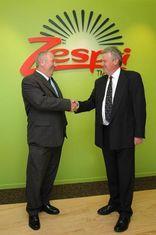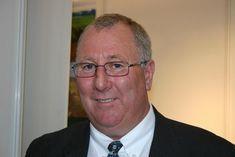

HortResearch ceo Paul McGilvary believes that “innovation is the key to keeping in business”. The New Zealand research organisation was the only exhibitor of its kind at Fruit Logistica and showcased super blueberries, white flesh peaches and avocado oil.
The research station was also responsible for golden kiwifruit and Jazz apples, which were on show elsewhere.
“Golden kiwifruit is one of the most important products developed for the fruit industry in the last 20 years,” said McGilvary. “It is already a NZ$300 million product and will be worth a lot more in years to come- it could become a 2m carton product, although it also has the potential to take some volume away from other varieties so it needs to be managed properly. Jazz has all the keeping and taste qualities demanded by the international markets. The Pacific varieties are hugely popular on the NZ domestic market and will continue to be so, but I think we’ll see Jazz supplant Pacific types for exports.
“Science is long term, but we have got to develop new marketing platforms for the fruit. I am not a marketing expert, it is the companies that are over here at Fruit Logistica are the ones that need to invest in their futures. Research is one of the key areas for investment and that is why we are here. Now we have been once, we will keep coming, it is a very positive thing for us to do. We are keen to shift intellectual property to people who can do things with it and are prepared to invest in it. Golden kiwifruit was sold to Zespri and has been a great success, now we have Prevar for the pipfruit industry, and that should help the development of new apple and pear varieties.”
HortResearch employs 500 people in Auckland and McGilvary recognises the need to expand its horizons. “The New Zealand industry alone cannot sustain us, that’s for sure,” said McGilvary. “I think there are opportunities in Europe for third party participation with European science organisations and the response we have had in Berlin confirms that. It is not a money-making exercise, but more of a way to build on our knowledge and abilities.”



